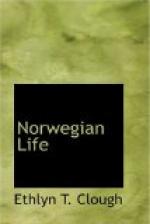It was Nobel’s object to reward and help the pure man of science, too much absorbed in his researches to think of drawing any industrial or pecuniary advantages from his scientific discoveries. “I would not leave anything to a man of action or industrial enterprise,” he said to a friend with whom he was discussing the project of his will; “the sudden acquisition of a fortune would probably only damp the energy and weaken the spirit of enterprise of such a man. I want to aid the dreamer, the scientific enthusiast, who forgets everything in the pursuit of his ideas.”
It seems like dropping from the sublime to the ridiculous to follow so ideal a benefaction with a report of so mundane a thing as a soup kitchen, but soup is as necessary to humanity at the present period of life as some of the exalted things of the intellect, and, as pauperism in Norway and Sweden is so almost unobservable, it is difficult to search out with the keenest vision any charity that is doing more than are the “steam kitchens” of Norway and Sweden. And the keenest vision would hardly observe that these “steam kitchens” are charitable institutions. They are called “steam kitchens” because they are the first institutions in the peninsula where steam was used for the cooking of food. The one at Stockholm, instituted by Prince Carl, is very similar in detail and operation to the one in Christiania, but the latter was established first and is more perfect in its arrangement and methods, so we will take it for illustration.
This kitchen at Christiania was established in 1858 by benevolent people to provide wholesome food for the poor at low prices. The charter granted to the company limited its profits to six per cent of the capital invested, with a provision that the balance, if any, should be paid into the poor fund of the city. There was a hard struggle at first to make both ends meet, and an annual deficit for many years, which was made up by the stockholders, but at last the “kitchen” became so popular that it began to pay dividends, and the stock has since been watered four times, until it now pays what is equivalent to twenty-four per cent annually upon the original investment, with a surplus larger than the capital on which it was started.




